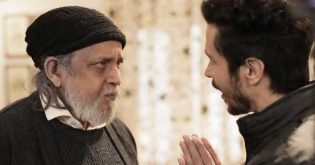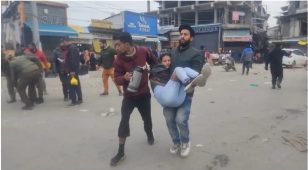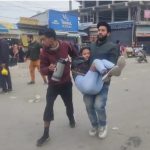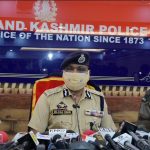From Midnight, Jammu And Kashmir Transitions Into Two Union Territories hindustantimes.com
The day will be marked by G C Murmu, a former bureaucrat from PM Modi’s home state of Gujarat, being sworn in as the first lieutenant governor of the union territory of Jammu and Kashmir.
On Thursday, India will wake up to one stateless and 2 union territories more as Presidential proclamation of August 9 giving assent to the bifurcation of Jammu and Kashmir into two Union Territories comes into effect.
The day will be marked by G C Murmu, a former bureaucrat from PM Modi’s home state of Gujarat, being sworn in as the first lieutenant governor of the union territory of Jammu and Kashmir. Another former civil servant, Radha Krishna Mathur, will take office as the lieutenant governor of Ladakh, the Buddhist-dominated region.
While UT of Ladakh will not have an assembly and will be directly governed by the Union Home Ministry through the L-G, Kashmir will have an assembly and will largely work along the lines of the Delhi model but rules to govern the Jammu and Kashmir Reorganisation Act, 2019 are yet to be notified.
Interestingly, the new UTs will be born on the National Unity Day, the birth anniversary of Sardar Vallabhbhai Patel who was India’s first home minister and a freedom fighter.
The bold and far-reaching decision was one of the key promises of the Bharatiya Janata Party in the run-up to May 2019 Lok Sabha elections. The BJP came back to power with a thumping majority with the party alone winning 303 seats in the 543-member Lok Sabha, well past the 288 sets of 2014. The NDA ended up with 352 seats.
Prime Minister Narendra Modi and his team took charge on May 30 and on August 5, in the first Parliament session of the new Lok Sabha, the all-important announcement on Jammu and Kashmir was made after mainline political leaders were detained, the state had been put under communication lockdown and other security restrictions that were withdrawn over next two and a half months. The Valley still does not have internet connectivity and pre-paid mobile phones are not operational but the aftermath of the move has been largely peaceful.
Three days after the far-reaching decision to abrogate the special status and bifurcate the state, Prime Minister Modi, in a nearly 40-minute televised address to the nation, sought to assuage concerns of the people saying Centre was with the people of the state and that their welfare was of utmost importance.
The government also made its intentions clear by ramping up measures to promote tourism and infrastructure investment in the new UTs.











Leave Your Comment